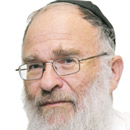Remembering the past, looking to the future
SEPTEMBER 3, 2009, is the 70th anniversary of the formal declaration of what we now refer to as World War II.
On Friday September 1, 1939, German forces invaded Poland; two days later, the refusal of Germany to withdraw its forces resulted in the British declaration of a state of war in accordance with the provisions of an agreement between Britain and Poland.
This was followed by the famous statement by Australian prime minister Robert Menzies, to the effect that Australia too, was at war.
For world Jewry, the ensuing six years were to be the worst since the destruction of the Temple and the associated independent Jewish state of old.
While the seeds of the Holocaust had been sown during the previous six years as the Nazi tentacles clamped down on every element of Jewish life in Germany and the rest of Central Europe, the world had refused to recognise the pending almost total destruction of European Jewry — which would be accompanied by death, destruction and untold misery for tens of millions of other world citizens.
On Shabbat September 2, as death and destruction already rained down on Poland, the prescribed Torah reading was, as it is this week, Parshat Ki Tavo. Little did those who heard it realise that they were about to witness the realisation of the horrific words of the tochacha (curses), which foreshadowed the advent of an attacking nation that favoured neither the elderly or youth; that one would fear each night and day without any assurance of life.
Australia, though far removed from the maelstrom of hatred and destruction, was already feeling its impact. The federal Census of 1933 recorded 23,553 declared Jews by religion.
The ensuing six years were to see the numbers increase by more than one-third; the immigration tempo increased in 1938-39 in the wake of the Anschluss (takeover of Austria) and Munich (the dismemberment of Czechoslovakia).
But the impact was not simply one of numbers. The character of the local community would also undergo irreversible change. The dominance of those affiliated with Anglo Jewry was doomed; the Europeans would make their mark on the community as a whole, including its religious and lay organisations, which were to be reorganised and revitalised.
And this brings me to another aspect. It is common to refer to the Australian Jewish community as a post-Holocaust community (the prewar arrivals incorporated in the figures cited above were obviously also refugees from the horrors of Nazism). But in this context, let us note that this weekend marks another anniversary as well.
On Friday September 1, 1939, the very day that Germany invaded Poland, the Melbourne-based Jewish Herald carried an advertisement advising residents of the Caulfield area that a minyan for the high holy days was to take place in that suburb.
The advertisement had been placed by the individual who would become the first president of Caulfield Hebrew Congregation, Mr Simon Roth (Rotkopf); it was out of that minyan that the congregation would formally be constituted a few years later.
Who in Australia today could imagine a Caulfield (or for that matter a Bondi) without the multiplicity of shuls, schools and institutions that are currently found there?
Yet, it was on that very fateful date in world Jewish history that this little announcement appeared -— an advertisement presaging the Caulfield of today, which had been placed before any realisation of what else would happen on the day it would be published.
Is it too fanciful to cast our minds back to 1492? It is recorded that at the very moment that Christopher Columbus was setting forth on his journey that would lead to the discovery of what would become that great haven of Diaspora Jewry -— America -— he saw from his ship the persecuted outcasts that were Spanish Jewry, setting foot on the little rickety boats that were to carry them away to a safer haven. Or perhaps (and without overstating the significance of Australian Jewry in world Jewish history), we might even remind ourselves that at the time of the Churban -— the day when according to tradition the Moshiach is born -— Rabbi Yochanan ben Zakkai found some comfort in the prospects for continuity, through the “hatzalah purta — the minor salvation” — of the saving of Yavneh and its scholars.
Australian Jewry has come a long way since then. We have much for which to be thankful. Let us never forget our debt to those who survived the Holocaust. Far from discouraged, they set about with vigour to build this great community from the ashes of the past. Our task is to ensure its continuity and further growth.
Yossi Aron is The AJN‘s religious affairs editor.


comments